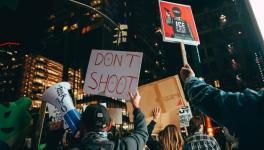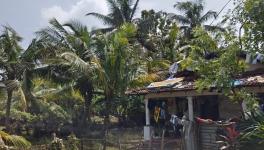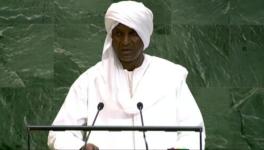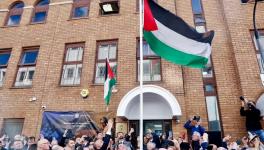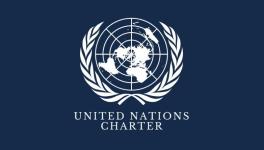International Colloquium Denounces Crimes of UN Mission in Haiti
Over 100 Haitian and international delegates have been participating in the International Colloquium “Occupation, Sovereignty, Solidarity: Towards a People’s Tribunal on Crimes of the MINUSTAH in Haiti". Photo: Alba Movimientos Haiti
In the history of brutal wars and imperialist occupations that have been such a common feature of the past centuries, the case of Haiti stands out. This is because Haiti is under military occupation by none other than the United Nations. The occupation began in 2004 following a US-backed coup against the democratically elected president Jean-Bertrand Aristide. The chaos that naturally follows a coup saw the UN Security Council deem the country a “threat to international peace and security in the region” and call for the invasion of Haiti by 10,000 troops from 31 countries.
In the following years, this UN ‘peacekeeping mission’ – the United Nations Stabilisation Mission in Haiti (MINUSTAH) – has been responsible for grave atrocities, including massacres, mass rape and the introduction of cholera into the country, leading to the death of 30,000 people. To this day, those responsible for these crimes have not been brought to justice.
Since December 7, over 100 Haitian and international delegates have been participating in the International Colloquium “Occupation, Sovereignty, Solidarity: Towards a People’s Tribunal on Crimes of the MINUSTAH in Haiti,” to continue on the long road to justice. The colloquium, organized by Platform to Advocate Alternative Development in Haiti (PAPDA), the Office of International Lawyers/ Institute for Justice & Democracy in Haiti (BAI/IJDH) and Haitian Movement of Liberty, Equality and Fraternity (MOLEGHAF), seeks to bring to account the people and structures culpable in the 15 years of UN occupation and the crimes committed by the MINUSTAH.
Participants and organizers of the colloquium have also been working on proposals for the creation of a People’s Tribunal to address the military occupation, as well as the question of ensuring justice and reparation for the victims of the cholera epidemic, sexual violence and repression.
During the 14 panel discussions and workshops organized as part of the colloquium, international delegates hailing from Argentina, Brazil, Cuba, the United States, France, Martinique, Mexico, Nepal, Puerto Rico, the Dominican Republic, Trinidad and Tobago, and Venezuela, as well as Haitian delegates from over 100 organizations, reaffirmed their bonds of solidarity, shared strategies to ensure justice and expressed their support for the victims and survivors of the atrocious crimes committed by the MINUSTAH.
Camille Chalmers, economist and coordinator of Alba Movimientos Haiti speaking in the International Colloquium. Photo: Alba Movimientos Haiti
Internationally recognized figures such as Nora Cortiñas, one of the founders of the Mothers of the Plaza de Mayo in Argentina, Opal Tometi, co-founder of Black Lives Matter, and Ricardo Seitenfus, took part in the colloquium.
Nora Cortiñas, one of the founders of the Mothers of the Plaza de Mayo in Argentina participated in the International Colloquium in Port-au-Prince. Photo: Alba Movimientos Haiti
Debt as punishment for freedom
The presence of delegates from Puerto Rico contributed to discussions on how to advance demands for restitution and reparation for the ‘debt’ unjustly paid by Haiti and Puerto Rico, which has had a lasting impact on the economies of the Caribbean nations.
Following Haiti’s heroic struggle for independence, France forced the first black republic in the world to pay reparations for the loss of wealth they ‘suffered’ when losing their slave plantations. France demanded that Haiti pay 150 million francs or risk a military invasion. The emerging republic was forced to borrow money from its former colonizer and later, from the United States. This external debt severely stunted its economic growth and affected its very survival itself.
In 2003, Haitian President Jean-Bertrand Aristide demanded that France pay Haiti $21 billion as reparations for what Haiti was forced to pay for its freedom. The demand was rejected by France and the following year, Aristide was overthrown in a US-backed coup.
Too often, the crimes committed against the Haitian people by France, the US, the United Nations and by the occupying troops from across the world, are buried and silently pardoned. In order for Haiti to thrive as a sovereign, stable nation, a true process of reparation and justice is necessary. It is essential to constantly recall that the relative stability and prosperity of imperialist countries like France and the US is thanks to the stolen wealth of nations like Haiti and the centuries of slave labor. The International Colloquium “Occupation, Sovereignty, Solidarity: Towards a People’s Tribunal on Crimes of the MINUSTAH in Haiti,” is an important moment in keeping alive this struggle for justice.
International Colloquium âOccupation, Sovereignty, Solidarity: Towards a Peopleâs Tribunal on Crimes of the MINUSTAH in Haitiâ. Photo: Alba Movimientos Haiti
Get the latest reports & analysis with people's perspective on Protests, movements & deep analytical videos, discussions of the current affairs in your Telegram app. Subscribe to NewsClick's Telegram channel & get Real-Time updates on stories, as they get published on our website.









